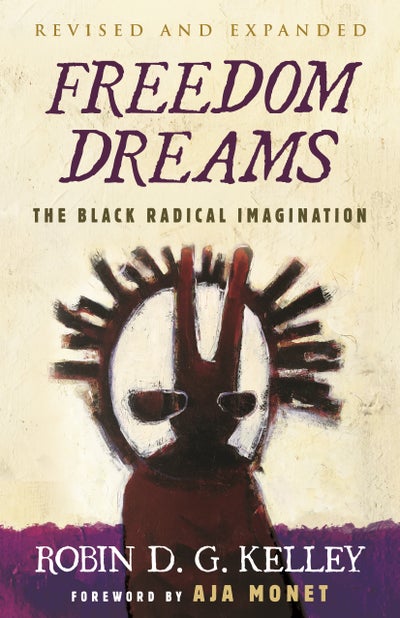
[ad_1]
The dust has settled on what we thought was the racial reckoning of 2020. During uprisings and protests across the globe, books from Black authors made it to the tops of sales charts. “Freedom Dreams: The Black Radical Imagination,” first published in 2003 and authored by scholar Robin D. G. Kelley, was among the titles that generated interest during what Kelley calls the “Black Spring” rebellion.
Last week, on August 23, “Freedom Dreams” was re-released as a special 20th anniversary edition with Kelley’s thoughts on “Black Spring” and its aftermath. The esteemed activist and UCLA professor spoke with ESSENCE about his radical vision and how we keep fighting when forces that oppose freedom are ever-present.
This interview has been edited for length and clarity.
ESSENCE: Why did you revise and expand Freedom Dreams?
Robin Kelley: Part of it has to do with what has transpired over the last 20 years. What’s the same, and what’s changed? In terms of what’s the same, so many of the struggles that I wrote about in the first book in the 1990s continue today: police violence, the struggle for reparations, even the war on terror, anti-Black violence, racism, Islamophobia, all that stuff. That was the core of the struggles, especially around gendered and racialized violence. Even reproductive justice was an issue that was really central to those struggles.
When I wrote the book, it was at the height of the war on terror. But part of our general understanding is that it was really the beginning of the war. [There is still] the violent repression of Palestinian people in Gaza and the West Bank, the ongoing cozy relationship between the U.S. and Saudi Arabia, you’ve got more US troops in Africa in the name of counterterrorism.
Then you’ve got counterterrorism in the United States, like the federal government’s surveillance on the movement for Black lives and calling them identity extremists. You’ve got the recent raid on homes and headquarters of the African People’s Socialist Party back in July [in St. Louis and St. Petersburg, Florida]. In the name of counterterrorism, the U.S. still keeps people like Mutulu Shakur behind bars who can’t even get compassionate release and is dying of cancer. So you’ve got the mainstream press telling us ‘oh yeah those days are over.’
In revisiting that time, I also want to talk about what has changed. What we’ve seen since then is an expansion of radical social movements. More of a presence of a feminist, queer justice movement; indigenous struggles for decolonization; climate justice; disability justice. The solidarity is more visual, [even though] you have a lot more polarization now.
We don’t have the luxury not to fight. There’s no guarantee that we’ll win…But if we don’t fight, we lose.
ESSENCE: How do you remain hopeful? In the book you mention fascist nightmares, but the focus of the book is our dreams. What inspires you to dream, especially as a historian and you see that there is this pendulum swing between progress and backlash?
Robin Kelley: You know what, I wouldn’t even say hopeful. I’ll say determined. I feel like what the history teaches us is that we don’t have the luxury not to fight. There’s no guarantee that we’ll win. Whatever winning means. But if we don’t fight, we lose. That is the one objective fact.
I realize that all the struggles I wrote about—whether it’s struggles for land, struggles for reparations, struggles on the left, struggles of Black feminists– they were all dealing with situations in which something like fascism was at the door. None of those movements were fueled by false optimism. They were fueled by their understanding of what was real and what was actually happening on the ground. Here they are trying to sustain life in the face of a system that, as Audrey Lorde says, never expected us to survive. It’s a death-dealing system of gendered, racial capitalism. Yet these are movements that teach us that the only way to ensure survival for Black people was to envision a different future and to bring that future into existence.

ESSENCE: How do you think—given the history of white backlash—that there is room for us to be radical? Because you’re not talking about a moderate dream. You’re talking about us radically dreaming.
Robin Kelley: We can look at this slightly differently. That resistance never disappears. It’s always there. What ebbs and flows is our power. In many ways, the Capitol insurrection wasn’t the result of a backlash because people who were with us just decided, ‘I got woke fatigue.’ Those white people weren’t even out there. What it really is is that we’re in a struggle for power. I think this is really important because what appears to be backlash is a resurgence of power. And our liberal state under Biden, Clinton, and Obama has never, ever done anything to protect us from the right. They are governed by capital; they are not governed by justice.
I actually don’t think those [Capitol rioters] were out there just because they wanted Trump. They were responding directly to spring 2020. It’s no accident that many people who showed up to riot at the Capitol were police. They were the National Guard. They were military. They were veterans. They represent the warrior class, and many of them are middle class entrepreneurs.
So how do we deal with it? I believe it’s about structures. There are all kinds of white working people who are being misled. When you convince them that whiteness is not doing much for you, they may see through the fake privileges of whiteness. People who believe that we need a break with capitalism, we have to fight that narrative fight and explain what’s fake. We don’t have to convince a whole lot of them; that’s not really our job. But I think that we can convince some. I know there’s some because I deal with them all the time, and they are dedicated to ending the system of oppression.
[Also] we don’t have state power. We have to engage in some level of electoral politics where it’s suitable. That’s not our freedom; but that’s our way to create breathing space and exercise some level of power to get some resources for us to keep moving.
One of the things that we have always done as Black people, as African people, is act as if we are making a better place for our children and making our ancestors proud by building on what they did.
ESSENCE: Your book chronicles the dreams of Black people and how we envision freedom across time. So what does your own dream of freedom look like?
Robin Kelley: That’s the hardest question I’ve ever had. It’s interesting because, in many ways, this book is extremely personal. It really does chart my own evolution, chapter by chapter. I don’t mean that each of those chapters represents something I’ve gone through and passed. I carry every single one of those chapters with me to this day. The idea of land and freedom, I’m down with that. We need power. We need systems of redistribution. I carry the dream of socialism. Reparations is still part of my freedom dream. What I imagine reparations is is not a payment for slavery. It’s to transfer wealth to movements, not just individual people. My freedom dream recognizes the wholeness of life itself. That is to say, as a spiritual and emotional being, that is connected to all of life itself. If we can get to that point, that’s way more revolutionary than simply being able to get resources. We are more than the sum of our economic needs.
ESSENCE: When we think about how Black people have been determined, we might have drawn on prayer, or mediation, arts or music. How do you live your life so you don’t get bogged down by nihilism?
Robin Kelley: I look into the eyes of my children. One of the things that we have always done as Black people, as African people, is act as if we are making a better place for our children and making our ancestors proud by building on what they did. So we see ourselves as part of this continuum as opposed to being in a particular time or place. I’m not suggesting everyone has children [laughter]. Even if it’s not your children, you look and build for the next generation. And you teach them. I just happen to have my kids who are always reminding me why I do this work.
[ad_2]
Source link







